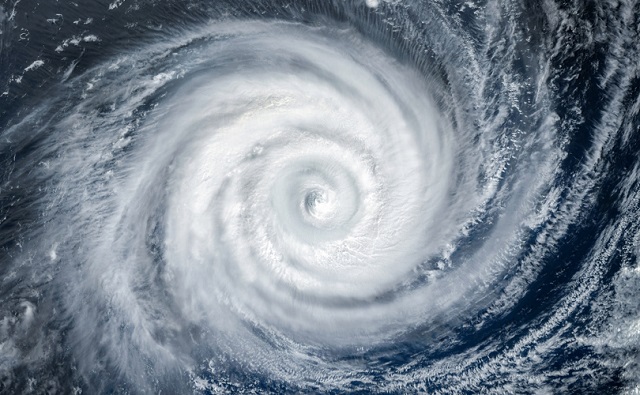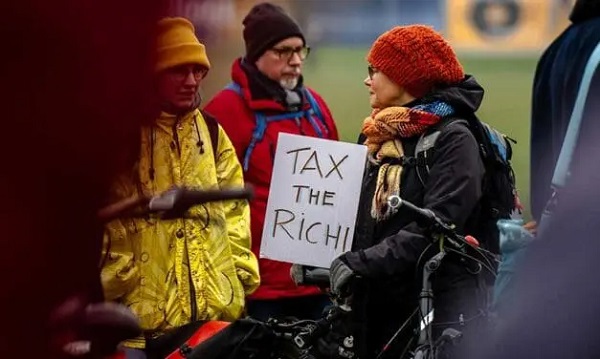International
There’s no scientific evidence of ‘human-induced climate change’ causing stronger hurricanes

From LifeSiteNews
The scientific consensus on hurricanes, which isn’t covered by breathless climate reporting, is that humans have had no detectable impact on hurricanes over the past century. We must demand honesty and contextual complexity on climate reporting.
As Hurricane Beryl barreled its way across the Gulf of Mexico and into the U.S. mainland, the attention-getting headlines had beaten it there by a long shot – claims that it was a remarkable outlier were appearing in climate-frantic narratives more than a week earlier.
CBS News claimed it was “historic,” alongside headlines on “How to talk to your kids about climate anxiety.” The BBC reported that it was “the first hurricane to reach the category four level in June since NHC [National Hurricane Center] records began and the earliest to hit category five – the highest category – in July.” While technically true, and warranting some mention, the claims tend to misrepresent, by implication and association, the current scientific understanding of hurricanes and human impacts on climate change.
The scientific consensus on hurricanes, a consensus not covered by breathless reporting on climate, is that humans have had no detectable impact on hurricanes over the past century. The National Climate Assessment published by the U.S. Global Change Research Program, for instance, in Appendix 3 reads:
There has been no significant trend in the global number of tropical cyclones nor has any trend been identified in the number of US land-falling hurricanes.
So what’s actually going on? Is Beryl’s historic early arrival an indication of something fundamentally different about hurricane activity? Does it or does it not represent the bitter fruit of humanity’s ecological sins? The answer is almost certainly not. Rather, the hype around Beryl’s early arrival represents a major misunderstanding, a mass-bias phenomenon which sees evidence where evidence doesn’t really exist.
Historically speaking, of course, hurricanes are commonplace in the Gulf. “Hurricane” derives from the prehistoric Taíno name for the god of evil winds, Jurucán. The Spanish quickly adopted the name to describe the violent storms which wreaked such havoc on their exploratory efforts in the New World. Both the 1527 Narváez and 1539 De Soto expeditions, for example, were pummeled by hurricanes that may well have reached category five, had the NHC been around to classify them as such. So while it is conceivable that Beryl is a major anomaly and portent of evil tidings, it is very unlikely to be.
Instead, its media portrayal as Exhibit A in the case for anthropogenic climate change is fundamentally inaccurate. Today’s dire headlines are a perfect example of what Steve Koonin, in his book Unsettled, calls “the long game of telephone that starts with the research literature and runs through the [scientific] assessment reports to the summaries of the assessment reports and on to the media coverage.”
The media, he says, often end up distributing a narrative that is directly counter to the actual evidence. They do this partly from misunderstanding the scientific and statistical significance of observations, but mostly because extreme headlines fit a generally understood narrative. Such reports are far more likely to be recognized and absorbed by the news-reading public. This selective attention pushes a bias toward extremism in climate reporting that significantly inflames the political climate, to our collective detriment.
Not widely reported, for instance, are counter-narrative facts such as that since 2011, major hurricane counts have dropped below their 170-year average. Or the fact that the Great Barrier Reef, once a poster-child of climate doom, has now hit record levels of coral cover. It doesn’t take a great deal of imagination to picture what the headlines would read if these positive facts were reversed: “Major Hurricanes: Highest Number in Centuries!” or “Barrier Reef Records Lowest Coverage in Recorded History.” These are headlines we can easily envision, but have not seen, because they are entirely backward.
Instead, what happens is that reports which are technically true (like Beryl’s record early arrival) make it into the common current only if they fit the general alarmist narrative. The BBC perfectly exemplifies this in its coverage, noting that “Hurricane Beryl’s record-breaking nature has put the role of climate change in the spotlight.” It then goes on to say, toward the end of an article most people will never fully read:
The causes of individual storms are complex, making it difficult to fully attribute specific cases to climate change. But exceptionally high sea surface temperatures are seen as a key reason why Hurricane Beryl has been so powerful.
This is how the slight-of-hand works: BBC reporters, no doubt in interviews with hurricane experts, were obliged to quibble somewhat about the implications of Beryl’s record-setting classification. They properly note that it is “difficult” (impossible, in fact) to attribute Beryl’s record to climate change as such. And they are correct that high sea surface temperatures are a major factor in Beryl’s extraordinary rise. But it is the way these technical truths are presented that leads to errors in association. Very few casual readers would be likely to read the article, headlined with “How record-breaking Hurricane Beryl is a sign of a warming world” and not make an inductive leap to the causal inference of human-induced warming. This is a problem, because such an inference is in fact not substantiated by any scientifically accepted observations.
Now, to be sure, this works both ways. This is not a claim that human emissions have no impacts, after all, only that we must be very careful about what the evidence actually says before channeling it into policy recommendations. Nor is my point that we can safely disregard all negative reports about the environment, since there are clearly issues that warrant our genuine collective attention. For instance, I’ve played a bit of sleight-of-hand myself: I correctly noted that major hurricanes are below the historical average, but I did not highlight the fact that overall hurricane count is up. Likewise with the Great Barrier Reef: while coral coverage is remarkably up, the kind of monoculture coral crop accounting for the rise still leaves room for ecological concern.
The real point is that we must demand honesty, including contextual complexity, on climate reporting. Especially since the stakes are so high (either in matters of our environment or individual liberty), we cannot afford to play games with half-truths and obfuscations. Intelligent free people deserve fuller, more comprehensive, less-activist reporting on climate change. Beryl has made a record of sorts, yes. What that record really means in the context of human-induced climate change is fundamentally, scientifically unknown. Maybe that would be a better headline.
Reprinted with permission from the American Institute for Economic Research.
CBDC Central Bank Digital Currency
Can the COVID Scamsters Stick the Landing?

But it’s another thing altogether for those conspirators to follow through on that psyop and actually achieve their desired end goal: the erection of the biosecurity state.
For those of us who managed to maintain our sanity over the last five years, the question is not whether COVID was a psyop—the answer to that question was obvious from the start—but whether the COVID conspirators have accomplished their objectives.
So, where do we stand in 2025? Did the COVID scamsters win?
Lockdowns
One of the intended effects of the COVID psyop was to take the concept of lockdowns and social distancing from the realm of obscure authoritarian fantasy to stone-cold reality.
As I pointed out in my 2020 video on “What NO ONE is Saying About The Lockdowns,” the idea of using school shutdowns, mandatory lockdowns and social distancing as pandemic prevention measures was first floated by Albequerque high school student Laura Glass for her local science fair project. (For those who are interested, she won third place!)
Prior to 2020, the notion of locking down healthy populations to prevent the spread of disease was still pie-in-the-sky fantasy. No government had seriously attempted to impose lockdowns or social distancing on a mass scale and the very thought of mass quarantines and government-imposed, electronically monitored lockdowns would have been laughed off as conspiracy paranoia.
On the other side of the 2020 divide, however, lockdowns became not only thinkable but an essential tool in the biosecurity state’s toolbelt.
Since 2020, for example, we have seen the extent to which lockdowns penetrated the popular imagination reflected in such ideas as “climate lockdowns.” After all, if locking people in their homes worked for a planetary health emergency, why not use it for a planetary climate emergency?
Yet another example of the mindset shift that has occurred over the past five years arrived last week when the UK Covid-19 Inquiry delivered its verdict that the lockdowns the UK government imposed during the scamdemic were “too little, too late“ and that they could have saved 23,000 lives by locking down earlier.
This is, of course, nonsense. Actually, it’s worse than nonsense; it’s nonsense based on made-up numbers from a known liar. As Off-Guardian point out in their (shadow-banned) tweet on the subject:

For those who don’t know, the tweet is referring to this passage from the inquiry’s report:
Professor Ferguson told the Inquiry that in later work which analyzed the impact of restrictions in England: “we explicitly modelled the counterfactual scenario of moving the lockdown of 23rd March back to 16th March, and estimated mortality … would have been reduced by 48%.“ That could have equated to a reduction in deaths in England from 48,600 to approximately 25,600 in the first wave up to 1 July 2020.
“Professor Ferguson” is, lest we forget, Neil Ferguson, the “virus modeller” (or should that be the “Liberal Lysenko“?) from Imperial College London who produced the computer model suggesting that 500,000 Britons were destined for the grave unless the UK government imposed a national lockdown. Ferguson has since walked back that claim and now denies calling for a lockdown at all, but it should be kept in mind that his about-face came after he was caught breaking the UK lockdown restrictions to carry on an affair with his married lover.
This is also the same Neil Ferguson who used his amazing “virus modeling” powers to predict 50,000 deaths from the UK’s 2002 mad cow outbreak (actual number of deaths: 177) and up to 200 million deaths from a potential, theoretical bird flu outbreak (which has yet to arrive).
Ferguson’s projection of what could have resulted if the government had locked down faster and earlier suffers from the same “garbage in, garbage out” tomfoolery as the Club of Rome’s environmental apocalypticism. Keep in mind that the number of people who would supposedly have been saved by a quicker UK lockdown is based on a fundamentally flawed input: the number of people who the UK government assert died of COVID. Those of us who called out the scam from the start have been noting for years that these COVID death tolls are statistical chicanery, since they rely on the fraudulent claim that everyone who died with COVID—as measured by the scientifically meaningless PCR test—had in fact died of COVID.
In other words, Ferguson’s numbers are plucked out of thin air and aren’t worth the paper they’re written on. They should not be taken seriously by anyone, whatever their opinion on the efficacy of lockdowns.
But, as usual, the damage has been done. The controlled establishment media has run their headlines about the lives that could have been saved by earlier lockdowns, and the type of people who still get their news from these mockingbird repeaters will now be more certain than ever that social distancing and quarantining populations is the right thing to do in the event of a declared health emergency.
Chalk that one up as a win for the COVID scamsters.
QR Codes, Vaccine Passports and Digital ID
Even more important to the would-be medical tyrants than the normalization of lockdowns and social distancing, however, was the creation of the technological infrastructure upon which the biosecurity state is enabled. This digital infrastructure includes:
- the QR codes that people were habituated into scanning before being allowed access to or egress from various quarantine zones;
- the vaccine passports that were used to assess compliance with vaccine mandates; and
- the various contract tracing apps and self-quarantine apps that were employed to keep track of citizens as they moved from place to place.
If you’ve read about my recent experience trying to order breakfast in Malaysia, you’ll know that, once again, the COVIDians have been remarkably successful in achieving their objectives. As I found out during that Malaysian sojourn, scanning QR codes to access online menus and using cashless payment systems to pay for purchases is becoming so normalized in certain parts of the world that it can be difficult to so much as order breakfast without a smartphone and cellular service. Indeed, the smartphone has become a virtual prerequisite for participation in the public space, and it was the scamdemic that allowed the shift to 100% dependence on smartphones to take place.
One recent demonstration of this smartphone requirement for participation in public life came from an email I received this week from a Corbett Reporter in Canada. He was trying to send a registered letter to the US via Canada Post but was informed that his addressed envelope alone would no longer do. Instead, he now had to fill out an online form and print off a special tracking number in order to mail the item. Not owning a smartphone, he was out of luck. He would have to go home, fill out the online forms on his desktop, print out the paperwork and bring it back to the post office. He opted not to send the letter, vowing instead to never again mail anything to the US.
Living in Japan as I do, the only surprising part of his story is that Canada held off making this change in their postal system for so long. Japan Post implemented the same electronic system for international mail four years ago. Of course, at that time the COVID border closures and postal delivery issues were used as the excuse for the intrusive new policy. But, given that country after country is now bringing in similar measures, the reality is clear: the change to a computer-dependent postal system is a global directive that was pushed, using the cover of COVID contagion, during the scamdemic. The end result is that one must either carry their smartphone with them at all times or spend extra time at home filling out online forms and printing off paperwork if they want to send mail internationally.
Of course, all of these technological “upgrades” to our daily experience—from the smartphone postal system to the QR code menus to the cashless payment systems—serve the same agenda. They are meant to pave the way toward the apotheosis of the biosecurity state: the consolidation of all our information into a single government-issued digital identity app. Soon, we will be giving the government real-time access to all of our daily movements, transactions and interactions and will be signing in with government-issued digital credentials everywhere we go online and in real life.
In the event of the next scamdemic, the scammers will hardly have to do anything at all. The QR code check-ins, vaccine passport checks and cashless payments will already be so much a part of our daily life that we’ll hardly notice any new scamdemic-related restrictions on our activities.
That’s another win for Team COVID. But they’re not done yet.
Clot shots
Another key goal of the scamdemic, of course, was to fast track government approval of mRNA and DNA “vaccine” technologies.
We know this, of course, because the conspirators told us as much in their own words. Who can forget the October 2019 Milken Institute-hosted discussion on the “Universal Flu Vaccine“? In case you have forgotten, that was the conference in which such luminaries as Tony Fauci and Rick Bright lamented that the poor, beleaguered Big Pharma corporations were going to have to spend billions of dollars and at least a decade of hard work proving the safety and efficacy of their DNA/mRNA injection techniques…unless some health emergency arose to justify the emergency approval of these experimental technologies.
So, were Fauci and Bright and their co-conspirators successful in their fast-tracking task? Did they circumvent a decade of regulatory approval work for their Big Pharma buddies? Well, if the point was to invoke a health emergency to get emergency approval for these clot shot monstrosities, then we need look no further than “Operation Warp Speed” for proof that the COVID conspirators were, in fact, remarkably successful.
And let’s never forget that Trump considers the Warp Speed MAGA jabs to be “one of the greatest things ever in politics or in the military!”
Lest there be any doubt about Trump’s devotion to this technology, let’s not forget that he hosted an event launching his $500 billion AI-pushing “Stargate” project on his third day in office earlier this year, at which Larry Ellison discussed using AI to develop personalized mRNA cancer vaccines. And just two months ago, Bill Gates used his place of honor at a White House banquet to boast that he and Trump were discussing “vaccines and gene editing” in their joint effort to “tak[e] American innovation to the next level.”
But this isn’t just about Trump, and it isn’t just about what’s happening in the US. This is a worldwide agenda. And, if this smattering of headlines from the past few months is any indication, the COVID era has given a gigantic shot in the arm (pun intended) to the clot shot “vaccine” manufacturers:
Experimental mRNA flu vaccine shows superior efficacy against symptomatic illness (just don’t ask about the side effects)
COVID Vaccine Tech May Reduce Disabilities in Snakebite Victims
Personalized mRNA Vaccines Will Revolutionize Cancer Treatment—If Funding Cuts Don’t Doom Them
The Dawn of Personalized DNA Vaccines
And, exactly in line with my reporting in Who Is Bill Gates? there’s this recent report
New Gates-Funded Microneedle Patch Implant Installs Both mRNA and Quantum Dot Markings Into the Body
Yes, it’s safe to say we are now ensconced in the era of genetic intervention masquerading as “vaccines.”
That’s another win for the WHO mafia.
Mission Accomplished?
I could go on. I haven’t even mentioned yet the passage of the WHO’s pandemic treaty or how its provisions actually encourage the work of the bioweapons industry…in the name of “defense” against such weapons, naturally. (A “poor man’s nuke,” anyone?)
But you get the point. Just as it’s difficult to deny that the COVID scamdemic was the biggest psyop of our lifetime, it’s equally difficult to deny that the perpetrators of that scam have been remarkably successful, achieving so many of their 2030 Agenda items in one fell swoop.
So, did the conspirators win?
The answer to this question is even more important than it might seem at first glance. History, as we know, is written by the winners, so if the WHO goons and their string-pullers and paymasters did indeed win, then our grandchildren will grow up learning about the terrible plague that threatened to wipe out the global population in 2020. They’ll read about how some crazy kooks resisted the loving lockdowns of the government and warned against the life-saving vaccines. They’ll truly believe we were only saved by the skin of our teeth thanks to our benevolent masters imposing lockdowns, mRNA clot shots and masks on us all (though they should have locked us down sooner and harder!).
This is why spreading the truth about these events is so vital. We must not let the lies stand. If these lies are written into the history books, then the conspirators really have won.
If you agree with me, share this report (or at least the evidence linked herein) with someone you love.
Like this type of essay? Then you’ll love The Corbett Report Subscriber newsletter, which contains my weekly editorial as well as recommended reading, viewing and listening.
If you’re a Corbett Report member, you can sign in to corbettreport.com and read the newsletter today.
Not a member yet? Sign up today to access the newsletter and support this work.
Are you already a member and don’t know how to sign in to the website? Contact me HERE and I’ll be happy to help you get logged in!
Subscribe to The Corbett Report
illegal immigration
While Trump has southern border secure, hundreds of thousands of illegal immigrants still flooding in from Canada

From The Center Square
By
Under the Biden administration, the greatest number of illegal border crossers at the U.S.-Canada border were reported in U.S. history, breaking records nearly every month for four years, The Center Square first reported.
While record high numbers dropped under the Trump administration, illegal entries still remain high in northern border states, with some states reporting more apprehensions in 2025 than during the Biden years.
Fourteen U.S. states share the longest international border in the world with Canada, totaling 5,525 miles across land and water.
The majority of illegal border crossers were apprehended and encountered in five northern border states, according to U.S. Customs and Border Protection data analyzed by The Center Square. Nearly half were reported in New York. Washington, Vermont, Maine and Montana recorded the next greatest numbers.
The majority of northern border states reported the greatest number of illegal entries in U.S. history in 2024, the last year of the Biden administration, according to CBP data. At the height of the border crisis, illegal entries reached nearly 200,000 at the northern border in 2024 and in 2023, first reported by The Center Square.
For fiscal years 2022 through 2025, 754,928 illegal border crossers were reported in 14 northern border states, according to the latest available CBP data.
From west to east, illegal entries at the northern border totaled:
-
Alaska: 7,380
-
Washington: 135,116
-
Idaho: 620
-
Montana: 32,036
-
North Dakota: 14,818
-
Minnesota: 8,315
-
Wisconsin: 118
-
Michigan: 50,321
-
Ohio: 1,546
-
Pennsylvania: 19,145
-
New York: 363,910
-
Vermont: 61,790
-
New Hampshire: 82
-
Maine: 59,731
Notably, Alaska, Idaho, New York, Pennsylvania and Wisconsin reported record high illegal crossings in 2023. Although Montana and North Dakota saw a drop in 2025 from record highs in 2024, the number of illegal border crossers apprehended in the two states in 2025 were greater than they were in 2022; in Montana they were more than double.
The data only includes nine months of the Trump administration. The CBP fiscal year goes from Oct. 1 through Sept. 30. Biden administration data includes the first three months of fiscal 2025, nine months of fiscal 2021, and all of fiscal years 2022, 2023 and 2024. Combined, illegal northern border crosser apprehensions totaled roughly one million under the Biden administration, according to CBP data.
The data excludes “gotaways,” the official term used by CBP to describe foreign nationals who illegally enter between ports of entry to evade capture, don’t make immigration claims and don’t return to their country of origin. CBP does not publicly report gotaway data. The Center Square exclusively obtained it from Border Patrol agents. More than two million gotaways were identified by Border Patrol agents under the Biden administration, although the figure is expected to be much higher, The Center Square first reported.
For decades, the northern border has been largely unmanned and unprotected with increased threats of terrorism and lack of operational control, The Center Square reported.
Unlike the 1,954-mile U.S.-Mexico border, there is no border wall, significantly less technological equipment exists and far fewer agents are stationed there.
Officials have explained that the data represents a fraction of illegal border crossers – it remains unclear how many really came through largely remote areas where one Border Patrol agent may be responsible for patrolling several hundred miles, The Center Square has reported.
Despite being understaffed and having far less resources, Border Patrol and CBP agents at the U.S.-Canada border apprehended the greatest number of known or suspected terrorists (KSTs) in U.S. history during the Biden administration – 1,216, or 64% of the KSTs apprehended nationwide, The Center Square exclusively reported.
In February, President Donald Trump for the first time in U.S. history declared a national emergency at the northern border, also ordering the U.S. military to implement border security measures there. After shutting down illegal entries at the southwest border, the administration acknowledged the majority of fentanyl and KSTs were coming through the northern border, The Center Square reported.
The Trump administration has also prioritized increased funding, recruitment and hiring and investment in technological capabilities at the northern border.
-

 Business2 days ago
Business2 days agoCanada’s climate agenda hit business hard but barely cut emissions
-

 Artificial Intelligence2 days ago
Artificial Intelligence2 days agoAI is accelerating the porn crisis as kids create, consume explicit deepfake images of classmates
-

 Business1 day ago
Business1 day agoCarney’s Toronto cabinet meetings cost $530,000
-

 Bruce Dowbiggin1 day ago
Bruce Dowbiggin1 day agoIntegration Or Indignation: Whose Strategy Worked Best Against Trump?
-

 Censorship Industrial Complex2 days ago
Censorship Industrial Complex2 days agoConservative MP Leslyn Lewis slams Liberal plan targeting religious exemption in hate speech bil
-

 Health2 days ago
Health2 days ago23,000+ Canadians died waiting for health care in one year as Liberals pushed euthanasia
-

 MAiD1 day ago
MAiD1 day ago101-year-old woman chooses assisted suicide — press treats her death as a social good
-

 Health2 days ago
Health2 days agoNews RFK Jr.’s vaccine committee to vote on ending Hepatitis B shot recommendation for newborns










